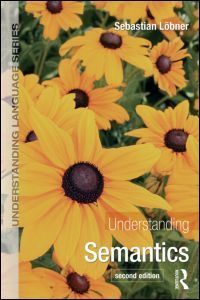Description
Understanding Semantics (2nd Ed.)
Understanding Language Series
Author: Loebner Sebastian
Language: English
Subject for Understanding Semantics:
Keywords
semantics; understanding; Löbner; Düsseldorf; english language; linguistics; structuralism; cognitive semantics; formal semantics; linguistic semantics; meaning; logic; Understanding semantics; Referential Argument; Vice Versa; Intransitive; Intransitive Verb; Light A2; Metonymical Shift; Logical Relations; Selectional Restrictions; Predicate Constants; Potential Referents; Graded Membership; Frame Matrix; Descriptive Meaning; PL Language; Open Tv; Yellow Socks; Frame Graph; Focal Colours; Apple Juice; Semiotic Triangle; Relational Nouns; Binary Features; Utterance Meaning; Functional Nouns; Argument Frame
Publication date: 06-2013
Support: Print on demand
Publication date: 06-2013
Support: Print on demand
Description
/li>Contents
/li>Biography
/li>
Understanding Semantics, Second Edition, provides an engaging and accessible introduction to linguistic semantics. The first part takes the reader through a step-by-step guide to the main phenomena and notions of semantics, covering levels and dimensions of meaning, ambiguity, meaning and context, logical relations and meaning relations, the basics of noun semantics, verb semantics and sentence semantics. The second part provides a critical introduction to the basic notions of the three major theoretical approaches to meaning: structuralism, cognitive semantics and formal semantics.
Key features include:
- A consistent mentalist perspective on meaning
- Broad coverage of lexical and sentence semantics, including three new chapters discussing deixis, NP semantics, presuppositions, verb semantics and frames
- Examples from a wider range of languages that include German, Japanese, Spanish and Russian.
- Practical exercises on linguistic data
- Companion website including all figures and tables from the book, an online dictionary, answers to the exercises and useful links at routledge.com/cw/loebner
This book is an essential resource for all undergraduate students studying semantics.
Sebastian Löbner is a Professor of Linguistics at the Institute for Language and Information at the University of Düsseldorf, Germany
1. Meaning and semantics
2. Dimensions of meaning
3. Ambiguity
4. Meaning and context
5. Predication
6. Verbs
7. Meaning and logic
8. Meaning relations
9. Meaning components
10. Meaning and language comparison
11. Meaning and cognition
12. Frames
13. Formal semantics
Sebastian Löbner is Professor for general linguistics at the University of Düsseldorf, Germany. His main research interests are linguistic semantics and cognitive linguistics.
These books may interest you

Semantics 129.87 €



